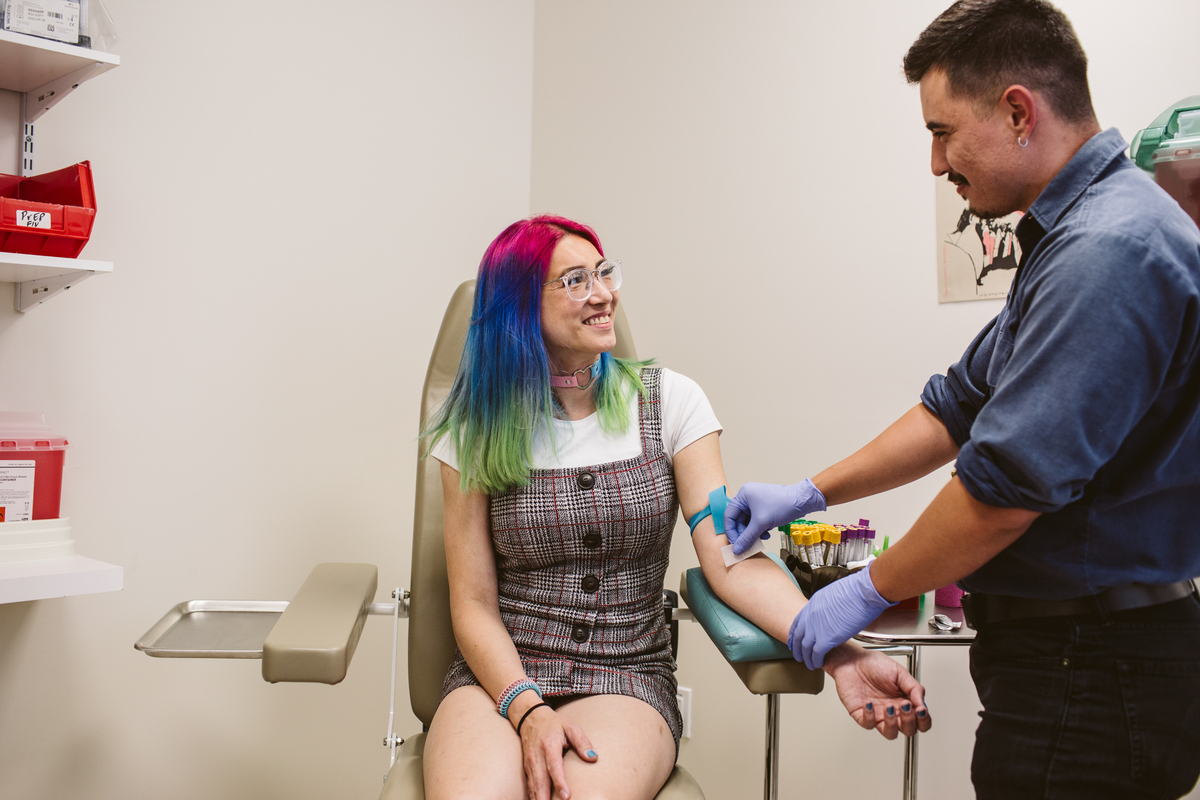Testing for HIV during PrEP care
The most accurate HIV test used in PrEP care is called a 4th-generation test. It’s used because it’s widely available, highly accurate, easy to use, lower cost, and generally has a faster turnaround time for results.
The 4th-generation test is also called a combo test, antibody/antigen test, or Ab/Ag test. It looks for two things: antibodies to HIV and a piece of HIV called p24. By looking for both, it can detect HIV infection sooner after transmission (2 to 4 weeks) than an antibody-only test (4 to 12 weeks).
Because the window period of a 4th-generation test is at least 2 weeks, if you had sex within a week or two of your first PrEP visit, share this with your healthcare provider. You may need another HIV test to confirm your status.
How to get tested for HIV & STIs

Quarterly HIV tests during PrEP care are free. Additional tests may have a small co-pay. Telehealth providers are also an option.
How to get tested for HIV & STIs

Learn more about HIV & STI Testing at SFAF and how to schedule routine testing at one of our locations.
How to get tested for HIV & STIs

Public clinics and sexual health clinics such as Planned Parenthood often have sliding-scale fees for HIV tests.
How to get tested for HIV & STIs

Visit hivtest.org for a comprehensive database of places to get HIV, STI, and other free or low-cost tests.
How to get tested for HIV & STIs

Many programs offer testing services in the office or at special events. Consult your local directory, dial 211 for community services, or search online for services near you.
How to get tested for HIV & STIs

Two types of kits are available—one that uses an oral swab and one that uses a finger prick for blood. Different companies offer them, such as Everly. They cost $50 to $60 and you can shop online or get them at various drug stores.
Screening for STIs during PrEP care
PrEP care usually involves screening for three common STIs: chlamydia, gonorrhea, and syphilis. Different tests are used: a urine test for gonorrhea and chlamydia, a blood test for syphilis, and swabs for gonorrhea and chlamydia. Swabbing the throat, vagina, front hole, and rectum may be done by medical staff or by you, depending on your healthcare provider’s practices. If you’re swabbing yourself, directions are included with the tests.
Make sure you get the body parts that you use for sex screened for STIs. It’s becoming more common to do three-site testing, which means screening 1) the throat, 2) the front (vagina, front hole, penis, urethra), and 3) the butt hole and rectum. If your provider doesn’t order tests for the right body parts, ask to get them included.
You may need to request additional tests for other STIs, such as herpes or genital warts, that are not normally covered by PrEP care. Be sure to complete the full treatment for all STIs, follow instructions regarding when you can resume having sex without transmitting, and notify your recent sex partners so they can get tested, too.
Many STIs may not cause symptoms. It’s common for people to have an STI like chlamydia but not feel discomfort, so keep up with your PrEP care visits to be sure you’re getting screened for STIs. This way, you can get treated and stay healthy, and those STIs don’t get passed on to someone else.
You also don’t have to wait for a quarterly PrEP visit to get tested for STIs. If a partner has told you they have an STI or you feel symptoms in between your visits, it’s best to deal with it promptly rather than wait for your next PrEP appointment.
Undetectable = Untransmittable (U=U)
U=U (Undetectable = Untransmittable) as an HIV prevention method depends on achieving and maintaining an undetectable viral load by taking ART daily as prescribed. When a person with HIV is on HIV meds (antiretroviral therapy, or ART) with a consistently undetectable HIV viral load, the virus cannot be transmitted to a sex partner.
“Undetectable” is a term that means there are such small quantities of virus that a lab test cannot find HIV in a sample of blood from a person living with HIV. These routine tests are highly accurate, but they cannot detect very low amounts of the virus. Although laboratories may have different lower levels of detection, “Undetectable” usually means below 200 copies of HIV in a sample of blood.
Being undetectable is good for a couple of reasons. One, people living with HIV who take medications and are undetectable over time will stay healthier longer. Two, they cannot pass HIV onto others through sex. (We don’t yet know if, or how much, U=U prevents transmission through sharing needles.)
We know U=U works because large global studies have shown no HIV transmissions among mixed-status couples when the partner with HIV was undetectable for 6 or more months. This included heterosexual and gay couples reporting more than 126,000 acts of sex without condoms.
A few terms are used—undetectable, treatment as prevention, and U=U—but they all mean the same thing: If a person living with HIV stays undetectable for 6 continuous months or more, then they do not transmit HIV through sex to other people.
PrEP Facts content written by Alan McCord and Reilly O’Neal. Medical review by Janessa Broussard, RN, MSN, AGNP-C, vice president of medical affairs at San Francisco AIDS Foundation.










